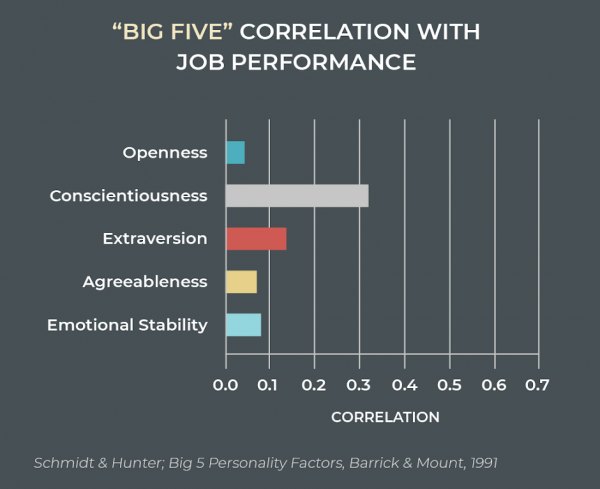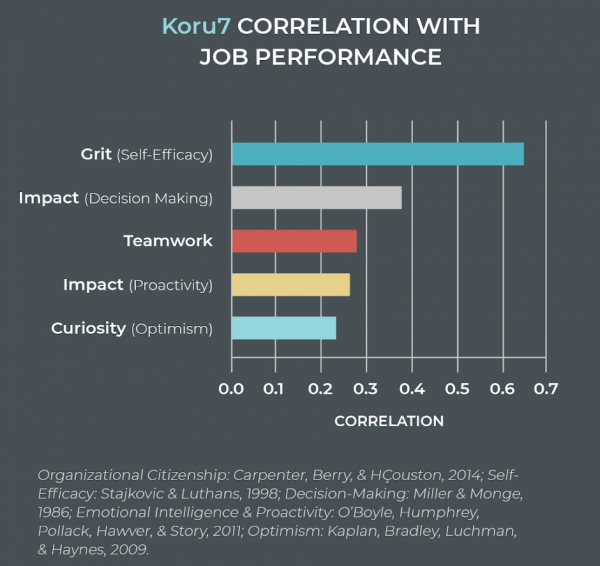Are the Big 5 a Big No for Predicting Performance?

Do you hire for personality or performance ? You’d likely say both, but if you’re evaluating candidate personality against factors such as the “the Big Five” or “OCEAN” dimensions (openness, conscientiousness, extraversion, agreeableness, and neuroticism), you should know that the results you get aren’t showing you the full picture of an applicant’s future performance.
The research into personality that led to the Big Five started in the early 1990s. While helpful for individuals and teams looking to improve their working relationships, these broad personality traits show only a mild correlation with job performance:

That’s not to say that personality measures don’t have anything useful to tell us in talent acquisition. What these personality-specific insights don’t tell us, however, is how a person will perform. Performance isn’t about personality. Rather, current hiring data point us to three key performance indicators:
- Intelligence/ IQ
- Technical skills
- Soft skills
IQ has a much stronger correlation with performance (moderate to strong), compared to most of the other OCEAN dimensions. Technical skills are pretty straightforward as well. But what about the notoriously elusive soft skills factor?
Research in the last 10 years has focused on noncognitive characteristics like soft skills — e.g., grit and emotional intelligence. Assessments around these soft skills are proving to be on par with intelligence tests in terms of their predictive power when it comes to employee performance. In light of this emerging research, employers would do well to decrease the emphasis on personality in hiring decisions and instead focus on skill sets (intelligence, technical skills) and behaviors (soft skill competencies).

In addition to personality, common signals for talent screening like college reputation, GPA, or prestigious past employers are no longer effective indicators. They are limiting, have minimal impact on performance, and can potentially lead to less diverse workforces. Google’s former chairman and head of hiring, Laszlo Bock, was famously quoted in The New York Times as saying, “GPAs are worthless as a criteria for hiring, and test scores are worthless. … We found that they don’t predict anything.”
Hiring for potential, therefore, can be more helpful than hiring based on past experience and grades. This is where soft skills assessments come in.
That said, what works at one company to assess soft skills is not going to automatically work for another — despite similar job titles or industries. We set out on a research mission to try to solve this problem, reviewing more than 85 existing organizational psychology studies, social psychology studies, and learning science research reports that tested indicators associated with individual work performance, retention, and life outcomes. Our efforts determined seven behaviors we can ascribe to performance potential — qualities such as grit, curiosity, and presence. Instead of grades, you screen for grit. Instead of college name, you look for rigor and impact.
Many organizations are adopting soft skill assessments in an effort to reduce bias, increase efficiency in the hiring process, and ultimately improve performance on the job.
Take Citibank for example. Like many Wall Street firms, Citi used to recruit students from elite schools and heavily weigh their GPAs — but the company had no standard with which it could compare all applicants, and the narrow focus on schools was cutting it off from other rich sources of talent. So Citi piloted a 20-minute survey to measure key soft skills such as rigor and presence. The tool creates a profile based on top-performing Citi employees against which candidates are compared. It also ranks candidates’ soft skills strengths and weaknesses, which allows Citi to conduct more informed interviews. Citi now gets a much more holistic view of candidates.
Soft skill assessments can also be used to increase diversity hires. In another example, a global bank was able to screen candidates for impact skills such as grit and rigor instead of hiring signals like past employer, GPA, or school, which could unintentionally screen out qualified candidates of diverse backgrounds. The bank also backed up this shift in screening procedure with unconscious bias training and interview workshops. As a result, the bank was able to multiply the offer rate for diverse candidates by four, with its interview to offer ratio going from 12:1 to 3:1.
As organizations move away from once popular signals for talent screening, we’ll continue to see a shift in hiring for potential and the need for predictive hiring analytics to support these new hiring decisions.
Kristen Hamilton is the CEO and cofounder of Koru.

